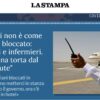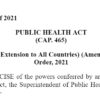Minister Clayton Bartolo is not having a good week at the office. The tourism sector for which he is responsible is the playing ground for a huge dilemma that pits two different priorities of a nation against each other. On the one hand, the sector depends heavily on the free movement of persons into the […]



